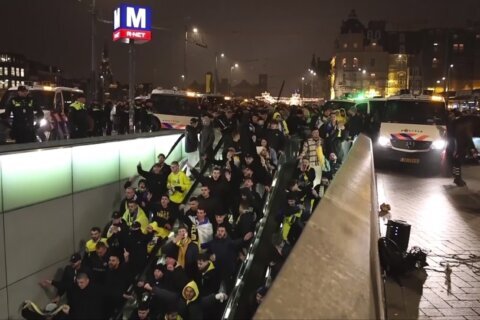PANAMA CITY (AP) — Six of the eight candidates vying to be Panama’s next president laid out their plans to generate jobs and to manage the country’s water crisis in their final debate Wednesday night before the country’s May 5 election.
Former government minister José Raúl Mulino, who has led in opinion polls since taking over the top place on his ticket when former President Ricardo Martinelli was sentenced to prison, skipped the event as he did the two previous debates.
Another candidate, José Gabriel Carrizo, was also absent after saying he would not participate if organizers could not get Mulino there.
The remaining field featured a couple of also-rans from previous elections — Ricardo Lombana and Rómulo Roux — as well as former President Martín Torrijos. Those three are in a virtual tie for second behind Mulino, according to recent polls.
The candidates promised job creation — some at far-fetched levels — and they concurred on the need to build a new reservoir, in large part to ensure sufficient water to run the Panama Canal. The critical passage has been forced to cut the number of ships transiting between the Pacific Ocean and Caribbean Sea each day due to reduced availability of the water needed to operate its huge locks.
The debate occurred as Panama awaited a ruling from the Supreme Court on a challenge to electoral authorities’ decision to let Mulino run without a vice presidential candidate on his ticket.
Martinelli, a 71-year-old businessman and supermarket magnate who governed Panama from 2009 to 2014, was convicted last July of money laundering in a case dating back to 2017 and related to his 2010 purchase of a publishing company that owns national newspapers. He was sentenced to more than 10 years in prison.
Panama’s constitution bars anyone sentenced to five or more years for a crime from running for president.
Last year, the United States government barred Martinelli and his immediate family from entering the country, based on what it called his involvement in “significant” corruption.
In February, Nicaragua granted Martinelli asylum as he holed up in that country’s embassy in Panama. Weeks later, Panamanian authorities ordered his arrest after a judge changed his conditional release while he appealed his prison sentence. Panama has not allowed Nicaragua to move Martinelli out of the country.
The drama has infused the election with uncertainty.
“It’s unprecedented for the the very special characteristics that it has. It’s tremendously complex because of the confluence of factors,” said Daniel Zovatto of the Wilson Center’s Latin American Program. “It’s one of the most complex that I’ve seen in 40 years.”
Copyright © 2024 The Associated Press. All rights reserved. This material may not be published, broadcast, written or redistributed.






